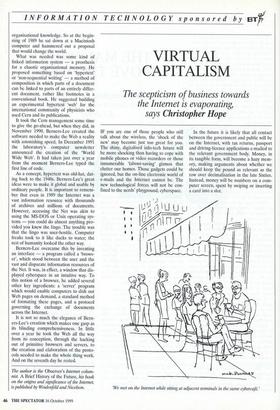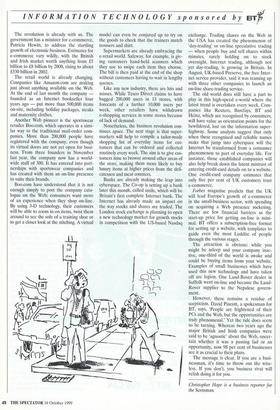VIRTUAL CAPITALISM
The scepticism of business towards the Internet is evaporating, says Christopher Hope
IF you are one of those people who still talk about the wireless, the 'shock of the new' may become just too great for you. The shiny, digitalised info-tech future will be more shocking than having to cope with mobile phones or video recorders or those innumerable labour-saving' gizmos that clutter our homes. Those gadgets could be ignored, but the on-line electronic world of e-mails and the Internet cannot be. The new technological forces will not be con- fined to the nerds' playground, cyberspace. In the future it is likely that all contact between the government and public will be on the Internet, with tax returns, passport and driving-licence applications e-mailed to the relevant government body. Money, in its tangible form, will become a hazy mem- ory, making arguments about whether we should keep the pound as relevant as the row over decimalisation in the late Sixties. Instead, money will be numbers on a com- puter screen, spent by swiping or inserting a card into a slot.
'We met on the Internet while sitting at adjacent term nals in the same cybercafe.' The revolution is already with us. The government has a minister for e-commerce, Patricia Hewitt, to address the startling growth of electronic business. Estimates for e-commerce vary wildly, with the British and Irish market worth anything from £5 billion to £8 billion by 2000, rising to about £330 billion in 2002.
The retail world is already changing. Companies like Amazon.com are making just about anything available on the Web. At the end of last month the company — founded as an Internet bookseller four years ago — put more than 500,000 items on-site, including holiday packages, steaks and maternity clothes.
Another Web pioneer is the sportswear retailer Boo.com, which operates in a simi- lar way to the traditional mail-order com- panies. More than 200,000 people have registered with the company, even though its virtual doors are not yet open for busi- ness. From three founders in November last year, the company now has a world- wide staff of 300. It has entered into part- nerships with sportswear companies and has created with them an on-line presence to suite their brands.
Boo.com have understood that it is not enough simply to post the company cata- logue on the Web; consumers want more of an experience when they shop on-line. By using 3-D technology, their customers will be able to zoom in on items, twist them around to see the sole of a training shoe or to get a closer look at the stitching. A virtual model can even be conjured up to try on the goods to check that the trainers match trousers and shirt.
Supermarkets are already embracing the e-retail world. Safeway, for example, is giv- ing customers hand-held scanners which they use to swipe each item they choose. The bill is then paid at the end of the shop without customers having to wait in lengthy queues.
Like any new industry, there are hits and misses. While Tesco Direct claims to have bagged 200,000 users in 13 stores, with forecasts of a further 10,000 users per week, other retailers have withdrawn e-shopping services in some stores because of lack of demand.
Nonetheless, the business revolution con- tinues apace. The next stage is that super- markets will help to compile a tailor-made shopping list of everyday items for cus- tomers that can be ordered and collected routinely every week. The aim is to give cus- tomers time to browse around other areas of the store, making them more likely to buy luxury items at higher prices from the deli- catessen and meat counters.
Banks are already making the leap into cyberspace. The Co-op is setting up a bank later this month, called smile, which will be Britain's first complete Internet bank. The Internet has already made an impact on the way stocks and shares are traded. The London stock exchange is planning to open a new technology market for growth stocks in competition with the US-based Nasdaq exchange, Trading shares on the Web in the USA has created the phenomenon of `day-trading' or on-line speculative trading — when people buy and sell shares within minutes, rarely holding on to stock overnight. Internet trading, although not yet day-trading, is growing in Britain. In August, UK-based Preserve, the free Inter- net service provider, said it was teaming up with three other companies to launch an on-line share-trading service.
The old world does still have a part to play in this high-speed e-world where the latest trend is overtaken every week. Com- panies like Reuters, Barclays, BT and Heinz, which are recognised by consumers, will have value as orientation points for the bewildered, lost on the information super- highway. Some analysts suggest that only when these recognised and reliable names make that jump into cyberspace will the Internet be transformed from a consumer phenomenon to part of everyday life. For instance, those established companies will also help break down the latent mistrust of entering credit-card details on to a website. One credit-card company estimates that only five per cent of UK customers trust e-commerce.
Forbes magazine predicts that the UK will lead Europe's growth of e-commerce in the small-business sector, with spending on acquiring a Web presence rocketing. There are few financial barriers as the start-up price for getting on-line is mini- mal. BT offers a subscription-free format for setting up a website, with templates to guide even the most Luddite of people through the various stages.
The attraction is obvious: while you might be asleep and your company inac- tive, one-third of the world is awake and could be buying items from your website. Examples of small businesses which have used this new technology and have taken off are legion. One Land-Rover dealer in Suffolk went on-line and became the Land- Rover supplier to the Nepalese govern- ment.
However, there remains a residue of scepticism. David Pincott, a spokesman for BT, says, 'People are frightened of their PCs and the Web, but the opportunities are truly phenomenal.' Yet the tide does seem to be turning. Whereas two years ago the major British and Irish companies were said to be `agnostic' about the Web, uncer- tain whether it was a passing fad or an opportunity, now 98 per cent of businesses see it as crucial to their plans.
The message is clear. If you are a busi- nessman, it's time to throw out the wire- less. If you don't, you business rival will relish doing it for you.
Christopher Hope is a business reporter for the Scotsman.



















































































 Previous page
Previous page